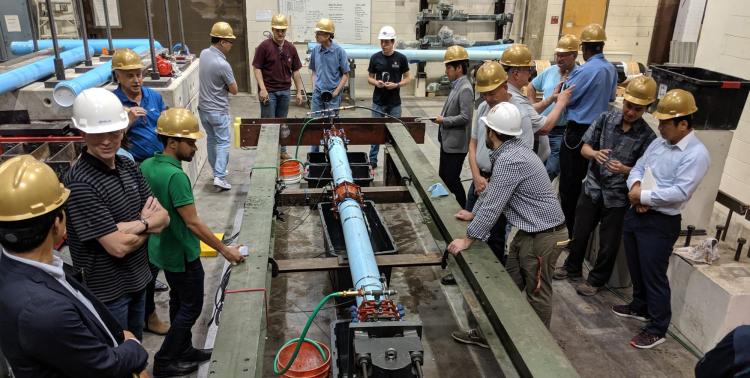Water industry leaders from across U.S. visit CU Boulder lab for seismic test demonstration

Water agency representatives, consultants and manufacturers, many of whom were attendees at American Water Works Association’s Annual Conference and Exposition in Denver, were invited to campus to tour CIEST’s unique experimental capabilities, including the 400 g-ton geotechnical centrifuge and one-million-pound capacity universal testing machines. The highlight demonstration was a full-scale earthquake test performed on a pressurized water pipeline.
The experiment represents one of many directed at addressing earthquake performance and system resiliency following a significant seismic shift. The research targets water system components that are vulnerable to ground movements imposed by earthquakes, landslides, differential settlements and other natural and human-induced sources. Our team of students, technicians and faculty assesses performance of new and innovative “hazard resistant” products and methods under worst-case, extreme loading conditions, which helps establish bounds for system assessment and engineering design.
The research efforts run parallel with the development of seismic design guidelines for water and wastewater pipelines, an American Society of Civil Engineers effort that will be the first to set design guidelines for two most critical lifelines systems.
The goal of our research project is to improve resiliency of critical lifeline systems, in this case water conveyance. Resiliency in our case is achieved through preserving water access for firefighting, to hospitals and emergency evaluation centers, immediately following a disaster, and returning service quickly to communities and business during the days following.
Our aging infrastructure is in need for repair, rehabilitation and replacement. Our research is focused on provided utilities the information and guidance needed to complete this critical effort with materials and components that will also improve their system’s resilience.
Brad Wham is an assistant research professor and managing director of the Center for Infrastructure, Energy and Space Testing. He holds a PhD in civil and environmental engineering from Cornell University.

